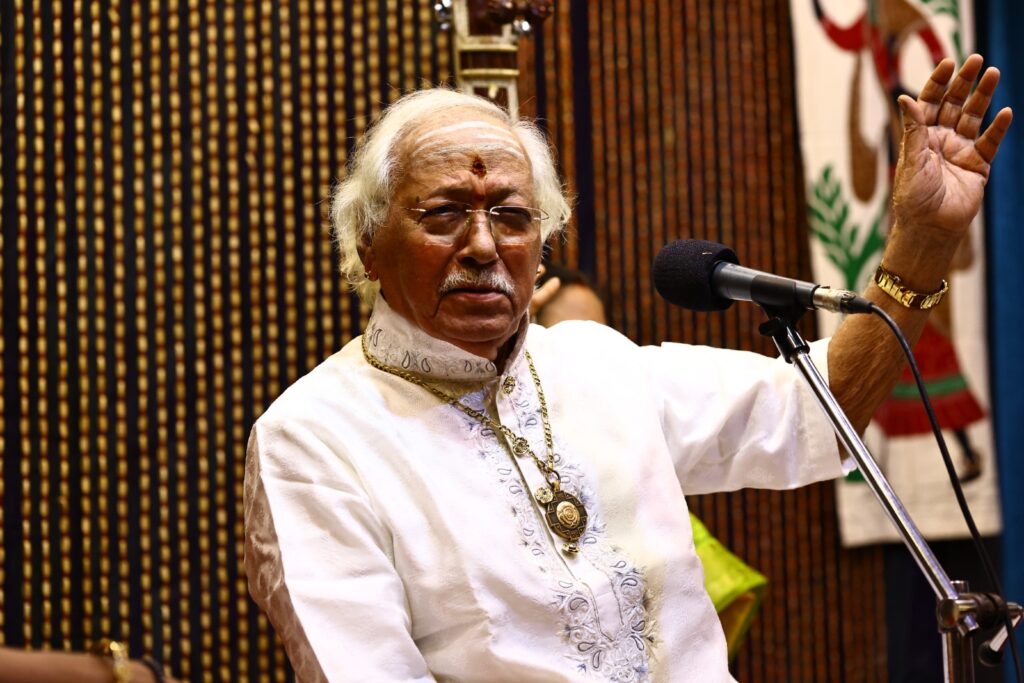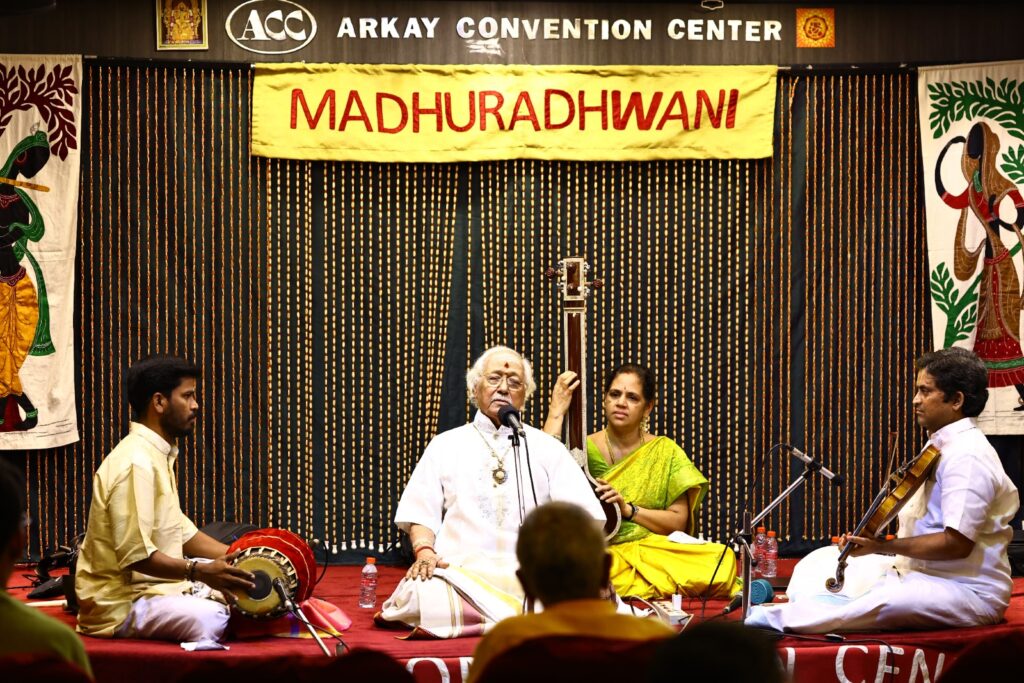TV Gopalakrishnan

Mridangist, vocalist, violinist, trained in Hindustani, PhD in music and Guru to many, 92-year-young Dr. T.V. Gopalakrishnan (TVG) is an incredibly versatile musician and talking to him was a walk through over 75 years of music.
At age 9, TVG played second mridangam for Chembai Vaidyanatha Bhagavatar (Chembai) at a wedding concert in Ernakulam. Chembai wanted TVG to move to Madras right away but TVG’s father insisted that he finish his degree first. Upon completing his B.Com, he promptly left. “I arrived in Madras in 1951 with only Rs. 100, a few clothes, my mridangam and sruti box,” he says. Chembai was an affectionate and nurturing Guru who fostered TVG’s individuality whilst pointing out what to glean from other masters.
This article appeared in The Hindu newspaper online on November 23rd, 2024 and in print on November 29th, 2024.
TVG joined the Accountant General’s (AG’s) Office, Madras in 1952, working there for nine years. “One more and I would have got lifelong pension,” he remarks. In 1953, when Madras State split, he was transferred to the Andhra AG’s office (though still domiciled in Madras). Violinist Dwaram Venkataswamy Naidu performed at the inauguration and TVG accompanied him on the mridangam. “After the concert, he told me that I would be his choice thenceforth, after Pazhani Subramania Pillai and Palghat Mani Iyer.”
TVG shared a special bond with Mani Iyer who played mridangam for 50-60 of his vocal concerts. “He himself offered – I never asked,” says TVG. “He would ask me what I was going to sing. I would request him to suggest.” Today’s headliners do not expect co-artistes to be synchronised, he says, recollecting how, in yesteryear, many would insist on practicing together.
Mani Iyer would tell him to practice songs a thousand times prior to performance. “Frequent repetition is essential for perfection and for every note to adhere to sruti,” TVG says. He advices musicians to fret less about new repertoire and focus more on how they execute their music, particularly on understanding lyrics and proper word splits. “While freshness should be infused with 1 or 2 new pieces, repertoire should never be completely overhauled.”
TVG has performed for All India Radio regularly from 1949 and says playing for specific durations enforced discipline. “In radio, I never ask who I am assigned to. As a senior artiste, I have played for Sikkil Sisters, DK Pattammal etc.”
TVG, who received the Sangita Kalanidhi in 2014, has great respect and admiration for The Music Academy. “It stands for the cause of musicians and instituted a title that is as respected as any national award.” After a couple of concerts in other slots earlier, from 1962, he played at the senior slots for his Guru, M. Balamuralikrishna, S. Kalyanaraman, the Sivanandams, M.D. Ramanathan and others. Since Chembai preferred TVG playing mainly for him, TVG performed only sporadically with other musicians until Chembai’s demise in 1974. Others he performed with include M.A. Kalyanakrishna Bhagavatar, S. Balachander and T.K. Govinda Rao. TVG also gave vocal concerts at The Music Academy in the senior slots.
His many programs alongside violinist M.S. Gopalakrishnan (MSG) were memorable. He recollects one where the two of them performed with D.K. Jayaraman. “Jayaraman was having voice trouble. I gently suggested he utilise MSG and me. Within a few minutes, he found his groove. Co-artistes should do everything they can to help the headliner. They should work on developing discernment (‘ruchi’). Violinists should not distort or twist the headliner’s music. Percussionists should learn moderation, carefully analysing intensity and density of play and executing appropriately.” On tani avartanam duration, he believes less is more, saying, “Mani Iyer rarely played for more than seven minutes.” What if a mridangist exceeds significantly? “I would just pick up the refrain.” Varying accompanying rubrics explain why many headliners prefer specific co-artistes, he remarks. “I don’t sing without Varadu (violinist S. Varadarajan), for instance. Sanjay (Subrahmanyan) also uses a specific set.” He simultaneously implores headliners to give space to co-artistes. “It is a sign of both skill and lack of ego.”
“Percussion for instruments is both more difficult and different.” This, he stresses, is why certain mridangists, like Thanjavur Upendran, Guruvayur Dorai and Umayalpuram Sivaraman, were preferred for instrumental concerts. “You cannot bang the instrument and get applause. Decibel level has to come down significantly and in that lower volume, each syllable should still ring clearly.”
Known for his nuanced, song and instrument-appropriate mridangam playing, he says, “Noise is injurious to mind, psyche and ears and diametrically opposite to aesthetics – yet today that is what generates applause.” He cites inadequate mridangam maintenance for percussive cacophony. “Getting a mridangam’s meettu and chaapu perfectly aligned is both difficult and time consuming. Only a well-maintained and perfectly tuned mridangam can be played melodiously. In instrumental concerts, discordances are even more discernible.”
He teaches all his students kutcheri dharma (concert etiquette), he says. Mentioning Varadarajan and mridangist Vijay Natesan, he adds, “I have mentored the largest number of performing musicians world over in so many fields – keyboard, saxophone, violin, mridangam, voice.”

Photograph courtesy: Sri. Rajappane Raju.
He concludes, “We have limitless opportunities now – anything can be sung by anyone in anyway, wearing anything. Who exactly is getting benefited, though? Since today’s rasikas are diplomatic, a frank Guru/mentor is critical, along with self-assessment and self-effacement. Our music is conversational – listener cum performer. Now that has gone. People say it is ‘my music.’ We are creating our own listeners with a mailing list. How does one generate new listeners then? When will you exercise, meditate or practice if you are cultivating a media image? Spend time on yourself. Cult followings are fashion – not passion. Perform as Iswara arpanam – then humility, moderation and pacing will manifest.”
Related Links:
TVG is a household name of Chennai. Very recently- mind at 92, he was playing Mridangam for a concert in the Arkay Convention center. Those rasigas who are aged like me, can easily recollect the majestic young, beautiful looking T.V.Gopalakrishnan Sir, accompanying such great Vocalists and on all occasions our eyes will close on TVG and his visible right hand fingers. Oh Yes. He adores many hats like Vocal, Mridhangam, violin, Hindustani and what not. He added beauty to Andhi mazhai pozhigiradhu by lending his voice, infact very brief, but well led the SPB song. It is always a proud moment for the greats of music in general and other Art forms, that they all have come from the land Kerala. Today we have more facilities in learning many art forms. But when Dr.TVG is the master of art forms ,we can only thank his parents for giving such a talent at 9 years of age, and Lord Guruvayurappan. Here we need to recollect in greater detail the services of Chembai Vaidhyanatha Bhagavathar for recognising and patronizing the talents of artists like TVG & K . J Yesudossji. There were 2 Mani iyers, Palghat & Madurai, and if I understand correctly Mrs.Lakshmi Anand, TVG was referring to vocalist Madurai Mani Iyer and as his accompanist for Mridhangam for more than 40 Concerts.
Thank you for reading and for writing in detail, Sir. In this case, Dr. TVG was referring to Palghat Sri. Mani Iyer playing mridangam for his (Dr. TVG) vocal concerts.